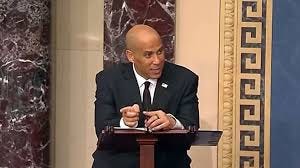Four weeks ago I wrote a post titled “Democrats should adopt the Trump campaign playbook”. This was the last time I addressed political strategy directly. In that piece, I wrote:
Democrats have gotten themselves tied up determining what the right messaging is to capture the attention of the voters. I’m no expert, but waiting for inflation to go up further and then decry that Trump said prices were going down isn’t going to work. The economic factors are too much in flux to make a solid case. The economic argument in 2024 was as much about vibes as actual data.
I went on to describe the need for various national figures in the Democratic Party to set up and constantly call attention to what was happening in Trump 2.0 and why it mattered. I nominated Senator Chris Murphy and representatives Alexandria Ocasio-Cortez, and Maxwell Frost. I don’t think I’m responsible but these are exactly the figures who have stepped up into the public eye.
Within the House and Senate, there hasn’t been much that the Democratic leadership could do and they have probably been too timid with the options they did have. Whether it was Schumer’s acquiescence on the shutdown vote or Jeffries wanting to “wait for the right pitch”, they haven’t been able to shift policy. And so the Big Beautiful Budget Bill looks like it’s moving forward.
Elsewhere, things are shifting. While the Democrats lost special congressional elections even though they gained ground, the Wisconsin Supreme Court election may be a bell weather.
Senator Corey Booker made a marathon speech on the floor of the Senate that lasted over 25 hours, breaking Strom Thurmond’s filibuster of the Civil Rights Act.
What was instructive about Booker’s speech was not it’s length showing his personal stamina. It wasn’t even the references to the late John Lewis and his call for “good trouble”. What made this speech different from others before it was that he used his time to share information about how individual constituents had been personally harmed, or who would be harmed, by the administration’s policies and Musk’s DOGE attacks.
People were feeling real threat from their government. The uncertainties surrounding social security, medicaid, the VA, NOAA, and the Department of Education make people imagine worst-cast scenarios. Booker and others have been talking about how to ease those uncertainties.
A week ago I was attending the Religion News Association conference in Arlington, Virginia. I missed the entire first day because I was stuck in the Newark airport for six hours. The second day was great. Saturday morning the sessions were on what to do if you got sued and how to use FOIA effectively. Not being a journalist, these didn’t quite fit. So I hiked over to the National Mall to see the “Hands-Off” protests there. Here is a shot of the crowd at the Sylvan Theater next to the Jefferson Memorial.
The crowd was estimated to be 100,000 strong in DC. There was another group filling the Mall itself. The next set of 50501 rallies in on April 19th.
These protests are good as a matter of public outrage. But they need to be channeled into action. The same is true for the various town halls (whether held by congress members or by those taking the stage when they refuse).
Campaign announcements are showing up in my texts. Nearly all of them are asking for funds. But that is not enough. We need a comprehensive political strategy on what they would campaign on beyond stopping Trump or defeating the incumbent.
I’ve been particularly intrigued by the candidacy of Kat Abughazelah in Illinois. I had followed her on social media for several years because she regularly debunked Fox News coverage for Media Matters. They she lost that job. So this 26 year old decided to run for congress. Her campaign video is very impressive. She says “we need a vision that is bigger than what we’ve been told is possible.”
Yesterday I drove to Colorado Springs to hear Sarah McCammon speak on her book at an event sponsored by the Center for the Study of Evangelicals. As is my practice when taking that drive (during rush hour downtown Denver), I listened to podcasts.
Two of them were echoing themes in Kat’s video. One was a Bulwark podcast where Tim Miller interviewed Patrick Gaspard who had served as Executive Director of the DNC. The other was a conversation between Jon Stewart and Pete Buttigieg.
While both conversations involved critiques of the Trump administration, especially in light of Tariff/Liberation week, the substantive parts of the podcasts imagined how Democrats can run going forward.
I think that direction takes Booker’s speech and then goes farther. It’s not enough to talk about people harmed by cuts. What is needed is to discuss what Good Government looks like.
This isn’t a defense of the status quo but a recognition that there are things that need to change in how government provides needed services. Rather than seeding the “government is broken” conversation to the Republicans, they call for reshaping government with outcomes in mind.
One particularly memorable exchange stands out between Stewart and Buttigieg. They argued that much of the bureaucratic slowdown in government comes because we have created numerous checks and balances to make sure that people aren’t gaming the system. Instead, we should be focused on how to get the agencies to focus on outcomes first and process second. That doesn’t mean we open the door to fraud and abuse but that we create legal mechanisms like audits to catch bad actors after the fact and prosecute them. This would go a ong way to defuse claims by Musk or Vance that systems are rife with fraud.
As I’ve written before, the conservative anti-government rhetoric has metasticized. The claim that we want government to be “small enough to drown it in the bathtub” was a nice talking point but now we’re seeing what happens when it becomes policy.
I’m hoping that all of those new candidates are taking this into consideration. It’s not enough to run against Trump, Musk, and Republicans. That feeds the “politics as usual” frame.
We don’t need a Project 2025 for Democrats or a progressive Joe Rogan podcast. What we need is a consistent and coherent focus on how government meets people’s felt needs, in collaboration with state and local governments. Streamline processes, upgrade technology, and make the desired outcomes paramount.
Those kinds of forward thinking, people focused, initiatives will give something for those crowds from Saturday to believe in. They won’t just be expressing their anger and frustration. They would be working for a better America, right when we need it.






The Dems have to hunker down red counties and listen to what their actual felt needs are. No strategies until the listening has been done. Very well done, John.